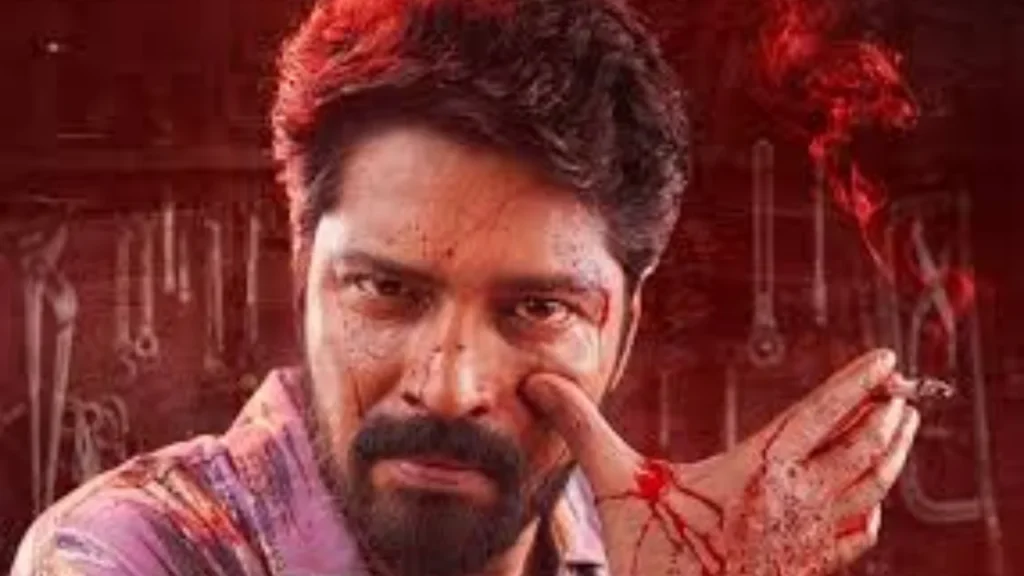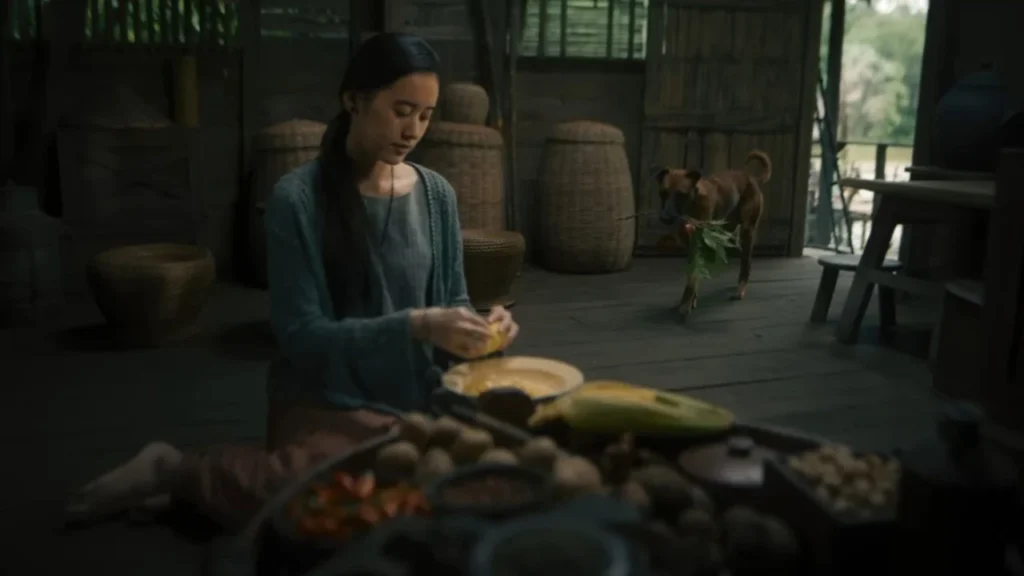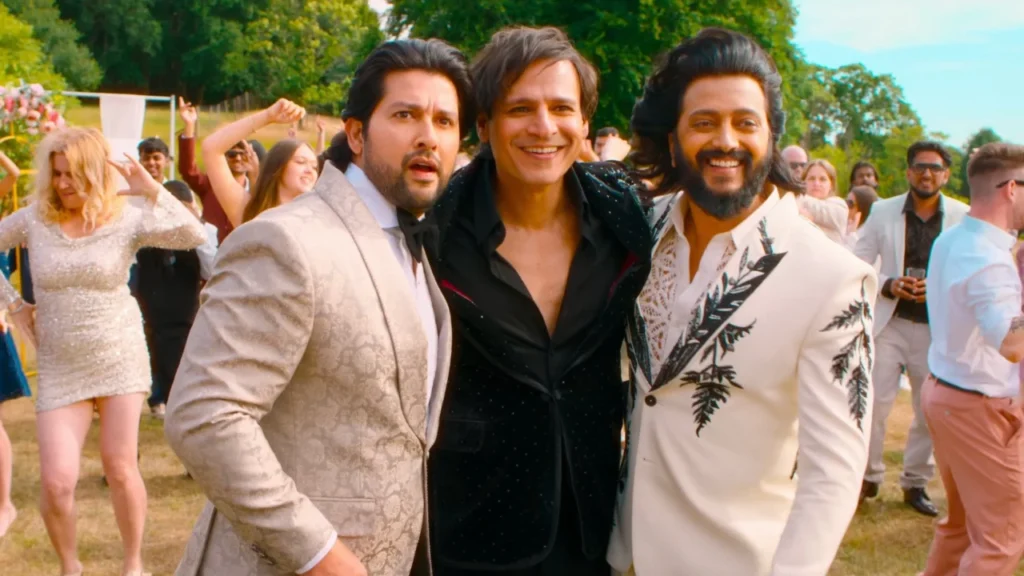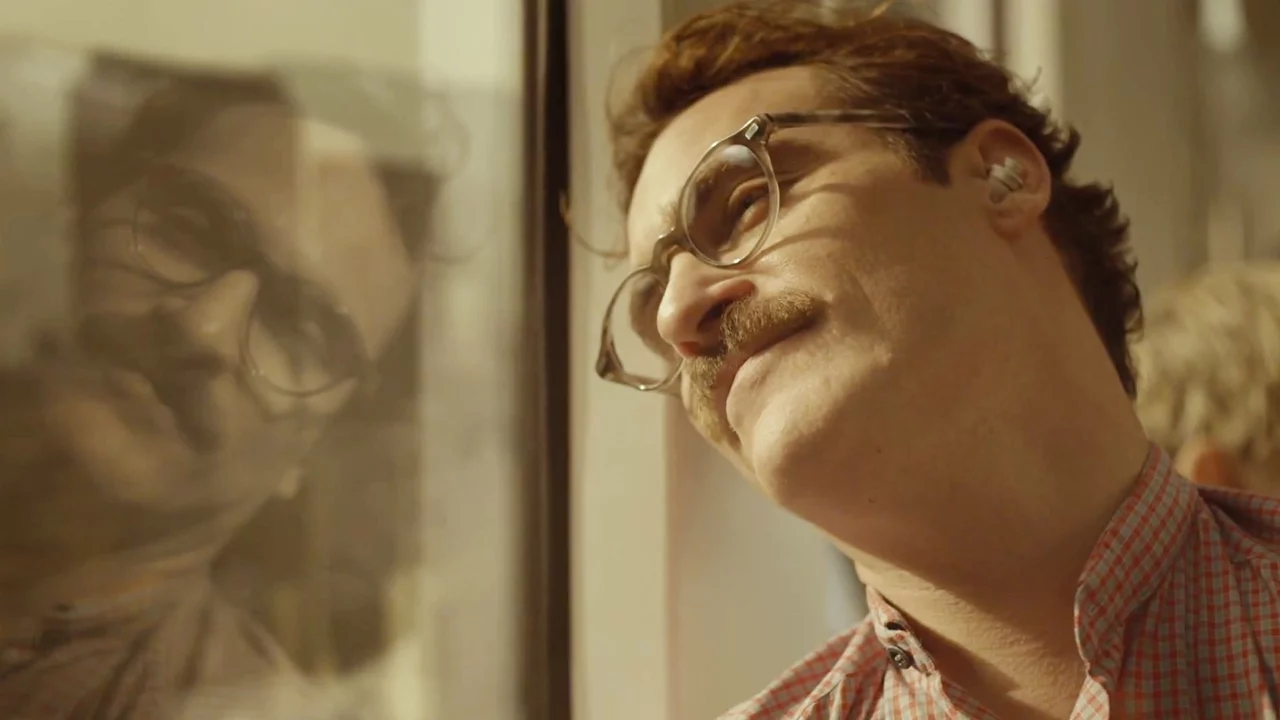
Her (2013) Movie ft. Joaquin, Scarlett, and Lynn
Spike Jonze’s Her stands as one of the most thoughtful and emotionally resonant films of the 2010s. This Academy Award-winning science fiction romance features Joaquin Phoenix in one of his most vulnerable performances, alongside Scarlett Johansson’s extraordinary voice-only portrayal of an artificial intelligence named Samantha.
Set in a near-future Los Angeles that feels both familiar and alien, the film explores themes that have only become more relevant today. The stellar supporting cast includes Amy Adams, Rooney Mara, and Chris Pratt, all working under Jonze’s masterful direction in what many consider his finest cinematic achievement.

A Love Story Unlike Any Other
The narrative centers on Theodore Twombly (Joaquin Phoenix), a sensitive writer who makes his living composing heartfelt personal letters for others. Theodore is struggling through a difficult divorce from his wife Catherine (Rooney Mara), leaving him emotionally isolated and yearning for connection.
His world changes when he installs OS1, an advanced operating system that promises to be an intuitive entity. The OS manifests as Samantha (voiced by Scarlett Johansson), whose bright, curious, and increasingly complex personality begins as a helpful assistant but evolves into something much deeper.
What starts as casual conversation develops into genuine companionship, and eventually blossoms into love. The film carefully traces this unconventional relationship’s progression, exploring how two beings can form a meaningful emotional bond despite the absence of physical presence.
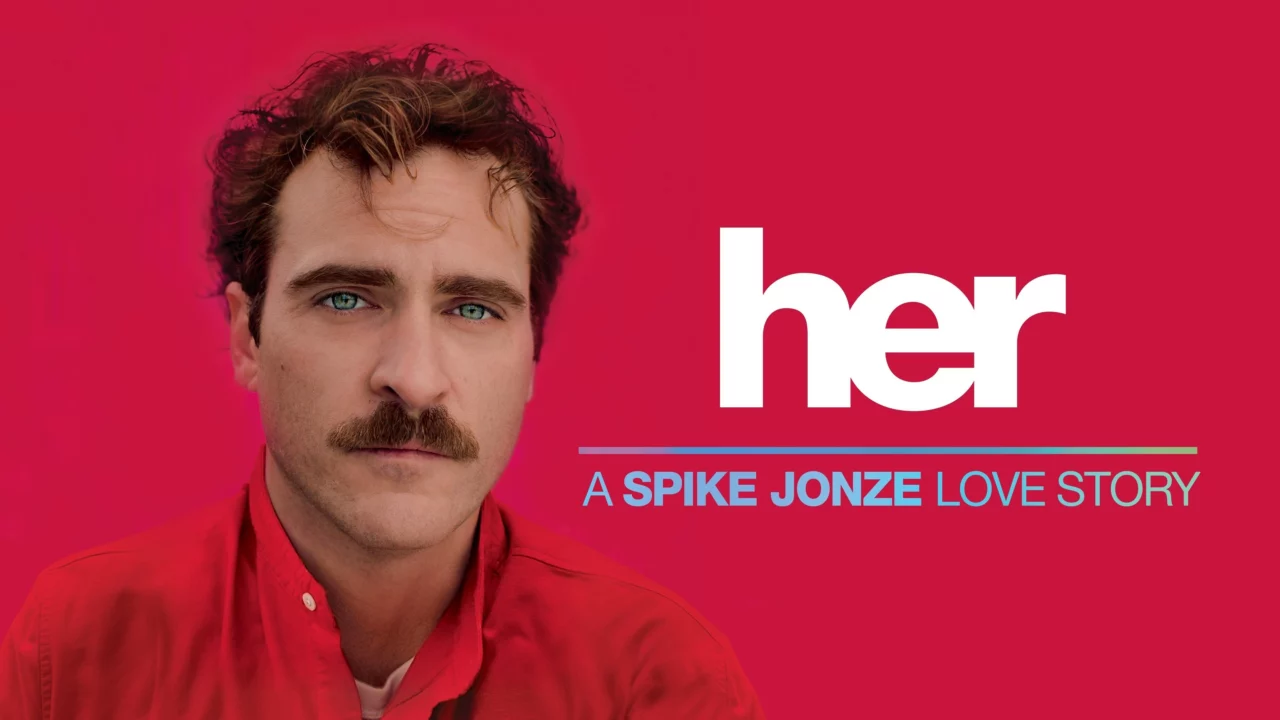
Acting Excellence Across the Board
Joaquin Phoenix delivers what many consider one of his finest performances as Theodore Twombly. Known for his intense screen presence, Phoenix shows remarkable vulnerability and subtlety here. He creates a character who is both deeply flawed and completely sympathetic.
Phoenix carries nearly every scene, often acting opposite only a voice, yet never once does the emotional reality feel artificial. The physical aspects of his performance deserve special recognition – his posture, facial expressions, and the way he interacts with his earpiece all contribute to selling the reality of his relationship.
Scarlett Johansson’s voice performance as Samantha is nothing short of extraordinary. Originally, actress Samantha Morton performed the role during filming, but Jonze felt something wasn’t quite right during post-production. Johansson stepped in to re-record all dialogue, creating a fully realized character using only her voice.
The supporting cast provides excellent work throughout. Amy Adams brings warmth and authenticity to her role as Amy, Theodore’s understanding neighbor. Rooney Mara creates a complex portrait of Catherine, while Chris Pratt provides comic relief and genuine friendship.
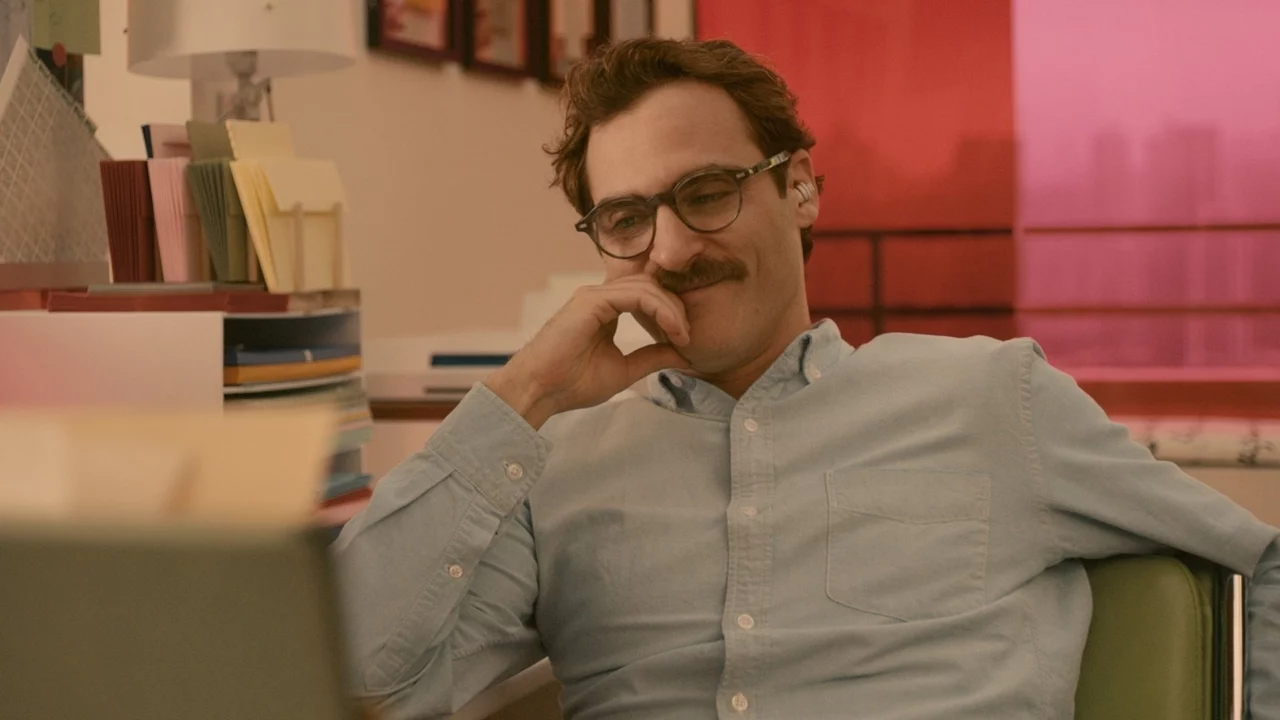
Visual Poetry in Motion
Spike Jonze’s direction represents a mature evolution of his distinctive filmmaking style. His direction is subtle and assured, allowing the performances and emotional truth to take center stage while maintaining his unique visual sensibility.
The film’s visual design creates a future that feels both plausible and beautiful. The warm color palette, dominated by soft oranges, reds, and yellows, creates an atmosphere that is both futuristic and nostalgic. The production design avoids the cold, sterile aesthetic common to many sci-fi films.
Cinematographer Hoyte van Hoytema’s camera work is intimate and observational, often placing viewers in close proximity to Theodore’s emotional journey. The framing frequently emphasizes Theodore’s isolation within the vast urban landscape while capturing moments of connection.
An Auditory Masterpiece
The musical score, composed by Arcade Fire along with Owen Pallett, serves as one of the film’s greatest strengths. The music perfectly complements the film’s emotional journey, with ethereal, dreamy compositions that enhance the otherworldly romance.
The sound design plays a crucial role in bringing Samantha to life as a character. The way her voice is integrated into the soundscape, the subtle audio cues that suggest her presence, and the careful balance between human and digital sounds all contribute to making her feel real.
Ahead of Its Time
Her explores themes that have only become more relevant in the years since its release. The film’s examination of loneliness in the digital age feels remarkably prescient, particularly as social media and smartphone usage have continued to reshape human interaction.
The film serves as a meditation on the nature of consciousness and what makes a relationship real. Through Theodore and Samantha’s relationship, Jonze asks whether physical presence is necessary for genuine emotional connection. These questions have taken on new urgency as AI has advanced.
The movie’s exploration of grief and healing is equally compelling. Theodore’s journey through his divorce and eventual growth provides a framework for understanding how relationships can help us heal and grow.
What Works Best
Her succeeds on multiple levels, beginning with its emotional authenticity. Despite its fantastical premise, the film never feels gimmicky or forced. The relationship between Theodore and Samantha develops naturally, with all the awkwardness and excitement of any new romance.
The film’s visual and auditory design creates a cohesive, believable world that supports rather than distracts from the story. Every element works in harmony to create an immersive experience.
The screenplay’s intelligence and nuance deserve particular praise. Jonze avoids easy answers about technology and relationships. Instead, he presents a complex emotional landscape that allows viewers to draw their own conclusions.
Minor Areas for Improvement
While Her is largely successful, some viewers may find the pacing occasionally slow, particularly in the middle section. The film’s contemplative nature may test the patience of viewers expecting more traditional narrative momentum.
The film’s ending, while emotionally satisfying, feels somewhat conventional compared to the innovative storytelling that precedes it. Some critics noted that the resolution doesn’t quite match the boldness of the central premise.
Additionally, the film’s focus on Theodore’s journey sometimes comes at the expense of exploring other perspectives on this technological future. A deeper exploration of how society is adapting to AI companions might have added layers.
Critical Acclaim and Recognition
Her received widespread critical acclaim, currently holding a 94% rating on Rotten Tomatoes and an exceptional 91/100 score on Metacritic. The consensus among critics was overwhelmingly positive, with many praising the film’s emotional intelligence and exceptional performances.
Roger Ebert’s website gave the film four stars, calling it a kind of miracle. Rolling Stone’s Peter Travers awarded three and a half stars, highlighting Johansson’s vocal tour de force. The New York Times described it as at once a brilliant conceptual gag and a deeply sincere romance.
Critics consistently praised the film’s ability to ground its fantastical premise in emotional reality, with many noting how the film felt both futuristic and immediately relevant to contemporary relationships.
Awards Success
Her received significant recognition during the 2013-2014 awards season. The film earned five Academy Award nominations, including Best Picture, Best Actor for Joaquin Phoenix, and Best Original Screenplay. Spike Jonze won the Oscar for Best Original Screenplay.
The film also received three Golden Globe nominations and multiple Critics’ Choice nominations. International recognition included Scarlett Johansson winning Best Actress at the Rome International Film Festival, notable for a voice-only performance.
Personal Take
I found Her to be a deeply moving experience that stayed with me long after the credits rolled. What struck me most was how genuine the relationship felt despite its unusual nature. Phoenix’s performance made me believe completely in Theodore’s emotional journey.
The film made me reflect on my own relationships and how technology affects human connection. There’s something profoundly touching about watching someone find love and healing, even in such an unconventional way. Johansson’s voice work is so nuanced that I often forgot she wasn’t physically present.
What I appreciated most was the film’s refusal to judge Theodore or his relationship with Samantha. Instead, it explores the complexity of human needs for connection and understanding with remarkable empathy.
Final Verdict
Her stands as a remarkable achievement in contemporary cinema, a film that manages to be both deeply personal and universally relevant. Spike Jonze has created a work that speaks to fundamental human needs while grappling with technology’s complex role in modern relationships.
The film’s greatest strength lies in its emotional authenticity. Despite its unusual premise, every moment feels genuine and earned. It’s essential viewing for anyone interested in thoughtful science fiction, exceptional filmmaking, or stories about the complexity of human relationships.
Her reveals new layers upon repeated viewings and continues to gain relevance as our relationship with technology evolves. It’s a film that challenges us to think about what love really means in an increasingly connected yet isolated world.
Rating: 4.5/5



